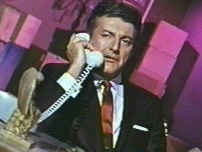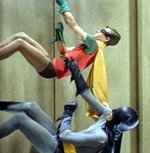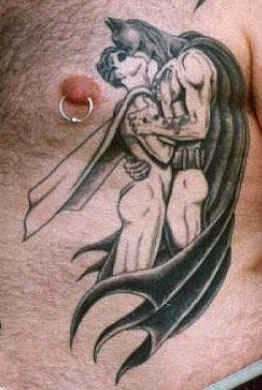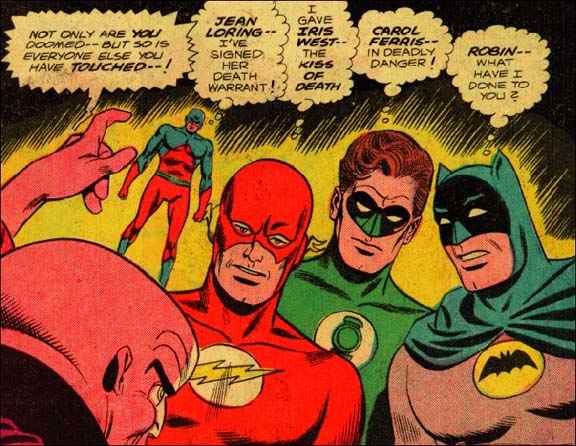rotten > Library > Culture > Batman
Batman
  The
sexual orientation of America's premiere caped crusader has been a point of
flaming contention for well over fifty years. For some people, witnessing a
cameo by Liberace as piano-playing villain "Chandel" on the television
series is sufficient proof, but let's allow the record to speak for itself. The
sexual orientation of America's premiere caped crusader has been a point of
flaming contention for well over fifty years. For some people, witnessing a
cameo by Liberace as piano-playing villain "Chandel" on the television
series is sufficient proof, but let's allow the record to speak for itself.
Batman's earliest uniform was little more than a skin tight, candy-colored
leotard which left little to the imagination. Instead of a frilly tutu, there
was a utility belt. This ensemble was further complimented by long, sweeping
cloakery and a bulging codpiece. Yes, the costuming was all very dandy, and
it further cemented an unspoken connection between fruity drama-queen acrobatics
and lead actor Adam West's propensity for high camp. Batman the comic,
Batman the television program, Batman the animated cartoon and
Batman the major motion picture series all cheerfully subscribe to characteristics
attributed to male homosexual culture across the globe.
Batman's eagerness to indulge in wrestling or full contact fisticuffs during
hand-to-hand combat easily reveals repressed queer intentionality similar to
that exhibited by tightly-wound homosexual delinquents who substitute violence
for intimacy. Batman's lack of commitment to women, specifically his inability
to maintain long-term, close relationships with female partners, is a recurrent
theme.
 Finally,
there's the constant presence of lifelong companion Robin, the boy wonder. They
work together, they play together. They slide down poles and try on different
outfits. Superhero crime fighters often assume secret identities which imply
they're firmly wedged in the closet with mom's lipstick, but Batman and Robin
are a truly a dynamic duo. Both conceal vast inner worlds of wrenching conflict
from public view. When one considers Batman came into creation during
a time in American history when homosexuality was illegal (or a curable mental
illness), further credibility to these accusations is readily sustained. Finally,
there's the constant presence of lifelong companion Robin, the boy wonder. They
work together, they play together. They slide down poles and try on different
outfits. Superhero crime fighters often assume secret identities which imply
they're firmly wedged in the closet with mom's lipstick, but Batman and Robin
are a truly a dynamic duo. Both conceal vast inner worlds of wrenching conflict
from public view. When one considers Batman came into creation during
a time in American history when homosexuality was illegal (or a curable mental
illness), further credibility to these accusations is readily sustained.
 The
most probing, penetrating, namblariffic analysis of Batman was originally
published in 1954. The Seduction of the Innocent outlined Bellevue Hospital
psychiatrist Fredric Wertham's hypothesis that Batman's fraternization with
Robin was a daddy-boy relationship, an adolescent-with-adult "Ganymede-Zeus"
narrative device operating at harmful, subconscious levels on America's youth. The
most probing, penetrating, namblariffic analysis of Batman was originally
published in 1954. The Seduction of the Innocent outlined Bellevue Hospital
psychiatrist Fredric Wertham's hypothesis that Batman's fraternization with
Robin was a daddy-boy relationship, an adolescent-with-adult "Ganymede-Zeus"
narrative device operating at harmful, subconscious levels on America's youth.
Wertham's initial essays seized the comics industry with panic and embarrassment as he drew more and more direct links between superheroes, gayness, and juvenile delinquency. Wonder Woman came under fire for hating men and being plainly lesbian. He labeled the union of Batman and Robin the "wish dream of two homosexuals living together". From The Seduction of the Innocent:
Sometimes they are shown on a couch, Bruce reclining and
Dick sitting next to him, jacket off, collar open, and his hand on his friend's
arm. Like girls in other stories, Robin is sometimes held captive by the villains
... Robin is a handsome aphetic boy, usually showing his uniform with bare legs.
He is buoyant with energy and devoted to nothing on earth or interplanetary
space as much as to Bruce Wayne. He often stands with legs spread, the genital
region discreetly evident.
Other times Batman ends up in bed injured, and young Robin
is by his side. At home they lead an idyllic life. They are Bruce Wayne and
"Dick" Grayson. Bruce is described as a "socialite" and the official relationship
is that Dick is Bruce's ward. They live in sumptuous quarters, with beautiful
flowers in large vases, and they own a butler, Alfred. Batman is sometimes shown
in a dressing gown.
  Contemporary
director Joel Shumacher has been universally applauded by gay groups for further
homoeroticising the Batman film franchise by adding to the costumes
of Val Kilmer and George Clooney a set of pert nipples, firmer buttocks, and
an extended, inflatable codpiece which more or less resembles a grocery basket
overstuffed with bananas. Contemporary
director Joel Shumacher has been universally applauded by gay groups for further
homoeroticising the Batman film franchise by adding to the costumes
of Val Kilmer and George Clooney a set of pert nipples, firmer buttocks, and
an extended, inflatable codpiece which more or less resembles a grocery basket
overstuffed with bananas.
If you're a University student who might like to develop a dissertation which
examines homosexual aspects of Batman, be cautioned that your academic
output might be limited in scope. Journalists, television producers, content
providers, and Web sites are regularly denied copyright access by DC Comics
if the angle of your story involves gayness.
Nevertheless, parody and pop culture analysis continues unabated. In 1996,
Robert Smeigel and J.J. Sedelmaier introduced America to superheroes Ace
& Gary: The Ambiguously Gay Duo. They fight crime while piloting a
dynamic supervehicle shaped like an enormous penis. As they battle evil-doers,
Ace & Gary pretzel themselves together into suggestive, homoerotic configurations
and pat each other on the ass. The initial cartoons were yanked by censors of
the Dana Carvey variety show, but The Ambiguously Gay Duo later
found a home on Saturday Night Live.
RealAudio: Batman responds to allegations that he and Robin are gay [MISSING FILE].

Timeline
| 1939 |
Batman #1 comic book published. |
| 1954 |
The Seduction of the Innocent. |
| 12 Jan 1966 |
Premiere of the Batman TV show. |
| 12 Oct 1966 |
Sammy Davis, Jr. makes a cameo appearance on the ABC television series Batman, during one of their legendary Batclimbs. |
| 7 Mar 1968 |
Zsa Zsa Gabor plays villain Minerva in the Batman TV show, episode #3.25 and also later episode #3.26 one week later. |
| 23 Jun 1989 |
Batman, a film by Tim Burton, opens. |
| 19 Jun 1992 |
Batman Returns, a somewhat less good film by Tim Burton, opens. |
| 14 Jun 1997 |
A pristine 1939 Batman #1 comic book sells for $68,500 at auction. |
| 16 Jun 1995 |
Batman Forever, a significantly less good film by Joel Schumacher, opens. |
| 20 Jun 1997 |
The really awful Batman and Robin, starring Arnold Schwarzenegger, opens. |
| 9 Sep 1997 |
Actor and Batman villain Burgess Meredith dies of melanoma and Alzheimer's, Malibu CA. He was cremated. |
| 2005 |
Oh god someone make it stop: Batman 5 scheduled for release. |
Batman Theme Song
Pornopolis |
Rotten |
Faces of Death |
Famous Nudes
|

 The
sexual orientation of America's premiere caped crusader has been a point of
flaming contention for well over fifty years. For some people, witnessing a
cameo by
The
sexual orientation of America's premiere caped crusader has been a point of
flaming contention for well over fifty years. For some people, witnessing a
cameo by  Finally,
there's the constant presence of lifelong companion Robin, the boy wonder. They
work together, they play together. They slide down poles and try on different
outfits. Superhero crime fighters often assume secret identities which imply
they're firmly wedged in the closet with mom's lipstick, but Batman and Robin
are a truly a dynamic duo. Both conceal vast inner worlds of wrenching conflict
from public view. When one considers Batman came into creation during
a time in American history when homosexuality was illegal (or a curable mental
illness), further credibility to these accusations is readily sustained.
Finally,
there's the constant presence of lifelong companion Robin, the boy wonder. They
work together, they play together. They slide down poles and try on different
outfits. Superhero crime fighters often assume secret identities which imply
they're firmly wedged in the closet with mom's lipstick, but Batman and Robin
are a truly a dynamic duo. Both conceal vast inner worlds of wrenching conflict
from public view. When one considers Batman came into creation during
a time in American history when homosexuality was illegal (or a curable mental
illness), further credibility to these accusations is readily sustained. The
most probing, penetrating, namblariffic analysis of Batman was originally
published in 1954. The Seduction of the Innocent outlined Bellevue Hospital
psychiatrist Fredric Wertham's hypothesis that Batman's fraternization with
Robin was a daddy-boy relationship, an adolescent-with-adult "Ganymede-Zeus"
narrative device operating at harmful, subconscious levels on America's youth.
The
most probing, penetrating, namblariffic analysis of Batman was originally
published in 1954. The Seduction of the Innocent outlined Bellevue Hospital
psychiatrist Fredric Wertham's hypothesis that Batman's fraternization with
Robin was a daddy-boy relationship, an adolescent-with-adult "Ganymede-Zeus"
narrative device operating at harmful, subconscious levels on America's youth.
 Contemporary
director Joel Shumacher has been universally applauded by gay groups for further
homoeroticising the Batman film franchise by adding to the costumes
of Val Kilmer and George Clooney a set of pert nipples, firmer buttocks, and
an extended, inflatable codpiece which more or less resembles a grocery basket
overstuffed with bananas.
Contemporary
director Joel Shumacher has been universally applauded by gay groups for further
homoeroticising the Batman film franchise by adding to the costumes
of Val Kilmer and George Clooney a set of pert nipples, firmer buttocks, and
an extended, inflatable codpiece which more or less resembles a grocery basket
overstuffed with bananas.
